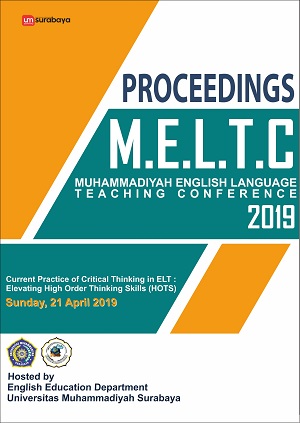Speaking Assessment Based On The 2013 Curriculum From English Teachers And Their Perception
Abstrak
This study was focused on the speaking assessment used by six English teachers at three Junior High School in Probolinggo. The objectives of this study are to explain; 1) the Implementation of Speaking Assessment based on 2013 Curriculum, 2) the types of speaking assessment from English teachers, and 3) teachers’ perception on speaking assessment based on 2013 curriculum. Type of this research was qualitative. The data were collected from interview, questionnaires, observation, and document analysis. The samples of this study were six English teachers who taught eight grade from three Junior High schools in Probolinggo. The data were classified and analyzed in qualitative way. The result showed that; 1) the English teachers of three Junior High Schools in probolinggo have applied the assessment in speaking, but not all standard was completed, 2) role play performance was used in assessing the students’ speaking skill, 3) teachers’ perception on speaking assessment was very good, and thought that the assessment could be the solution for their problems in assessing student’s speaking skill.
Keywords: assessment, speaking, curriculum 2013, perception.
Referensi
Apriliyanti, R., Warsono, & Mujiyanto, J. (2018). The Correlation between Interest, Motivation, English Self-Concept and English Speaking Performance in Nursing Students. English Educational Journal, 8 (3), 9 – 18.
Ary, Donald et.al. 2010. Introduction to Research in Education. 8th Ed. Belmont, California: Wadsworth Cengage Learning.
Brown, H. D. (2004). Language Assessment Principle and Classroom Practice, New York: Longman.
Dewi, D. S. (2015). Corrective Feedback in Speaking Class. Journal Anglo-Saxon VI, 8, 03-09
Fraenkel, J. R. & Wallen, N. E. (2009). How to design and evaluate research education, New York: McGraw-Hill.
Gay, L. R., Mills, E. G., & Airasian, P. (2011). Educational Research: Competencies for Analysis and Applications (10th Ed), USA: Pearson Education.
Gustaman, W. W. (2015). The Correlation between Students’ Self-Esteem and Their English Speaking Competencies (A Study of Eleventh Grade Students at a Public Senior High School in Cimahi). Journal of English and Education, 3(2), 121-137.
Hidayah, J. (2017). Speaking and Writing Assessment Applied by English Lecturers of State College for Islamic Studies (STAIN) at Curup-Bengkulu. English Franca. Vol 1 No 01.
Idayani, A. & Rugaiyah. (2017). An Analysis of Teachers’ Strategies in Conducting Speaking Assessments at MTsN Andalan Pekanbaru. J-SHMIC (Journal of English for Academic), Vol 4, No 1.
Insani, H. D. (2014). The Portrayal of the Role-Play Implementation in Teaching Speaking to the Students of Tourism Study Program. Journal of English and Education, 2(2), 1-13.
Khunaifi, H & Hartono, R. (2015). Teacher’s And Student’s Perceptions of Corrective Feedback in Teaching Speaking. English Educational Journal, 5 (2), 14-20.
Kunandar. (2013). Penilaian Autentik. Jakarta: PT. Rajagrafindo Persada.
Liskinasih, A. (2016). Corrective Feedbacks in CLT-Adopted Classrooms’ Interactions. Indonesian Journal of Applied Linguistics, Vol. 6 No. 1, Pp. 60-69.
Metruk, R. (2018). Comparing Holistic and Analytic Ways of Scoring in the Assessment of Speaking Skills. The Journal of Teaching English For Specific and Academic Purposes, Vol. 6, No 1, pp. 179ï€189.
Milchatun, Bharati, D. A. L., & Hartono, R. (2015). Improving Students’ Personal Self Concept through Role Play Technique in Teaching Speaking Skill. English Education Journal, 5 (1), 1-9.
Mufanti, R. (2016). Highly Proficiency Learners on Noticing Strategy towards Corrective Feedback. Journal of English Educators Society (JEES), Volume 1, Page 19-30.
Mukminatien, N. (2000). The Advantages Of Using An Analytic Scoring Procedure In Speaking Assessment. TEFLIN Journal, Volume XI Number I.
Noormaliah. (2016). The Implementation of Authentic Assessment by English Teachers at Seventh Grade of Smp Muhammadiyah Banjarbaru. Proceeding at National Seminar of Current Trends on Research Methodology in English Language Teaching held in Banjarmasin, February 17th, 2016.
Rahman, F., Babu, R. & Ashrafuzzaman. (2011). Assessment and Feedback Practices in the English Language Classroom. Journal of Nepal English Language Teachers’ Association (NELTA), Vol. 16 No. 1-2, 97-106.
Rahmawati, S. M. (2017). Direct and Indirect Corrective Feedback on EFL Students Writing Skill: A Case Study in a Junior High School in Bandung. Journal of English and Education, Vol. 5 No. 1, pp. 64 - 71
Rukmini, D. & Saputri, L. A. D. E. (2017). The Authentic Assessment to Measure Students’ English Productive Skills Based on 2013 Curriculum. Indonesian
Journal of Applied Linguistics, Vol. 7 No. 2, September 2017, pp. 263-273
Saefurrohman & Balinas, E. S. (2016). English Teachers Classroom Assessment Practices. International Journal of Evaluation and Research in Education (IJERE), Vol.5, No.1, pp. 82 ~ 92.
Samsibar & Naro, W. (2018). The Effectiveness of Role Play Method toward Students’ Motivation In English Conversation. English, Teaching, Learning And Research Journal, Volume 4, Number 01.
Ulker, V. (2017). The Design and Use of Speaking Assessment Rubrics. Journal of Education and Practice, Vol.8, No.32.
Uzer, Y. V. (2017). The Correlation between Vocabulary Mastery and English Speaking Ability of the Tenth Grade Students of Senior High School 12 Palembang. ANGLO-SAXON, VOL. 8, NO. 2:251-258 Journal of Teaching English For Specific and Academic Purposes, Vol. 6, No 1, pp. 179ï€189.






